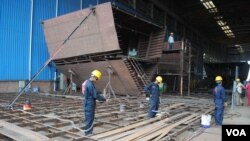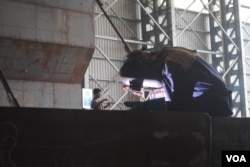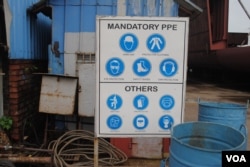At Western Marine’s shipyard on the edge of the Bay of Bengal, machines shriek and sparks fly as workers turn hulking pieces of metal into gigantic ships. The clanging of hammers echoes as a stray dog trots across a cavernous hangar.
The port city of Chittagong in Bangladesh is notorious for its ship-breaking industry, where old ships are broken down by hand in dangerous work conditions.
Lesser known is that Bangladesh, a coastal country abundant with rivers, has more than 100 shipbuilding yards. Western Marine is the country’s best-known shipbuilder and makes everything from cargo and passenger ships to ferries and fishing trawlers.
The company was started in 2000 by Bangladeshi marine engineers and mariners who saw the need for safer ships in light of old, outdated ones in Bangladesh breaking down or sinking. It became a publicly listed company in Bangladesh in 2014.
Western Marine began making ships for Germany in 2009 and also became the first non-Scandinavian shipbuilder to supply ferries to Denmark. Western Marine has also delivered ships and ferries to Finland, Tanzania and Ecuador, and is building ships for New Zealand, Kenya and Pakistan. Bangladeshi-made ships appeal to international buyers because they are roughly 10 to 30 percent less costly than ships made in Korea, China and India.
Take a walk through Western Marine’s shipyard and something else stands out -- workers who are welding, running powerful saws and other heavy equipment wear blue coveralls, yellow hard hats, heavy shoes, goggles and gloves. Signs throughout the shipyard have slogans such as “Wear Boots” and “Wear Face Shields".
Safety is not something to be taken for granted in Bangladesh, a chaotic developing country where protective gear is an alien concept. In cities it is common to see construction workers wearing sandals carrying steel beams and welding with no goggles.
But at Western Marine, workplace safety is strictly enforced. In 2012, the company was awarded OHSAS 18001, the global occupational health and safety management certification. It also received ISO 14001, the internationally recognized standard for environment management. It is one of the only companies in Bangladesh to have both certificates.
Not long ago, Western Marine had poor safety standards that are the norm Bangladesh. This resulted in shockingly high injury rates. In February 2011, Western Marine counted 1,000 injuries a month out of a workforce of 3,500. Cuts, burns and eye injuries were common due to lack of safety measures and basic protective gear such as goggles, gloves, harnesses and sturdy scaffolding.
When Western Marine started making ships for Germany in 2009, the German aid agency GiZ approached the company about starting a safety program. After a welder without protective gear was electrocuted in 2010, Western Marine hired an international safety consultant.
Within 15 months of launching its safety program, Western Marine dramatically reduced its injury rate - by 99 percent, to 10 injuries a month by June 2012.
The dramatic improvement is especially relevant as Bangladesh is halfway through a sweeping campaign to make 3,500 export garment factories safe workplaces by 2017. The 2013 collapse of the Rana Plaza garment factory that killed 1,100 workers in Dhaka – the world’s worst garment factory disaster – put a harsh spotlight on safety violations.
But for Western Marine, it wasn’t as easy as just handing out hard hats and work boots. Workers accustomed to wearing sandals and loose clothing in Chittagong’s hot climate did not want to wear protective gear.
Mohammed Ibrahim, a senior safety officer at Western Marine, recalls that at first workers did not understand the need for protective gear. “They did not know about safety,” he said.
But rules were strictly enforced. Workers who didn’t follow rules were given warnings, further training, fined or even fired.
Workers who violated safety rules were warned three times, and then fined 100 taka (about $1.30) per violation. At first, the majority of workers paid the fines. Then when they saw their pay was docked for safety violations, they eventually began following the rules. Western Marine also gave bonuses to workers who used proper safety gear.
In addition to ensuring the well-being of workers, there is also a strong business incentive to upgrade workplace safety.
Western Marine’s safety certifications led to new orders from international buyers in New Zealand, Tanzania and Kenya who want or require high safety standards, says Sakhawat Hossain, managing director of Western Marine.
“Now, In Europe, no [ship] orders will be given to you without the certificates,” said Hossain. “If we don’t train people, they will invite accidents, damage to equipment and my business. They will damage my things, themselves and my reputation.”
“Maybe we increased one percent in costs, but we saved 100 percent of our image,” he added.






